“We Have to Take a Stand”: Rise in Anti-Asian Attacks Sparks Calls to Action
For Asian Americans in metro Detroit, support after the March 16 shootings has been heartening, but they say it’s time to talk about what’s next and how to achieve actual change in solidarity with other communities.
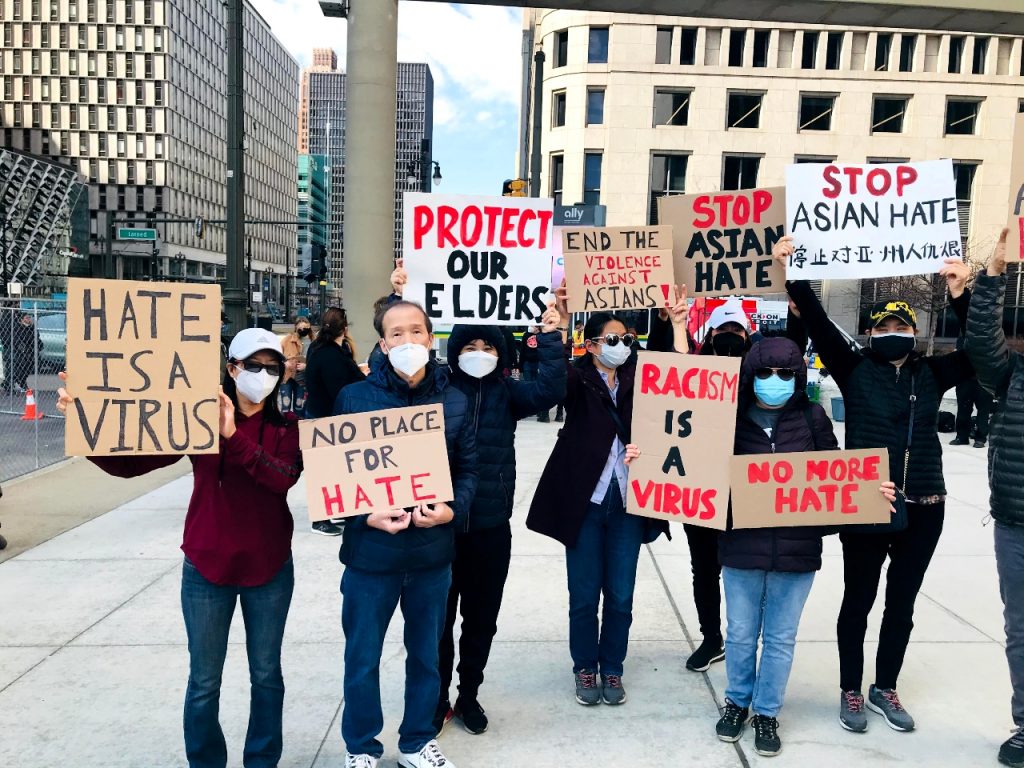
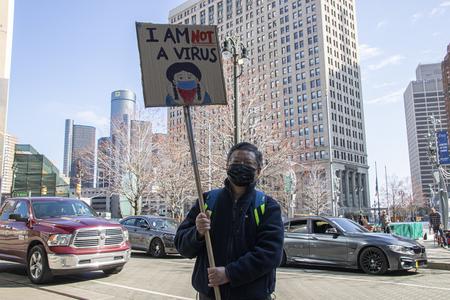
An increase in anti-Asian discrimination and the March shootings in Atlanta have sparked outrage across Asian American and Pacific Islander communities, including here in Michigan. Now community members are saying it’s time to take action.
On a sunny chilly Saturday in March, hundreds of people gathered in front of the Spirit of Detroit statue to protest the recent rise of attacks on Asian Americans. It’s one of several rallies that took place in the wake of the March 16 shootings in Atlanta, when a gunman opened fire at several spas. Eight people were killed, including six women of Asian descent. The shootings brought discrimination against Asian Americans and Pacific Islanders to the forefront nationally. But for many in the AAPI community, it was a pivotal point after a year of physical and verbal attacks.
Since the novel coronavirus was discovered in Wuhan, China in late 2019, violence and anti-Asian rhetoric have escalated. It’s been further stoked by politicians, including former President Trump, who called COVID-19 the “Kung Flu” and the “China virus.”
Xiao Wu from Northville says the recent attacks are intolerable. Wu has lived in the U.S. for 30 years after immigrating from China.
“So that’s why the quiet, nice Asian people decide to march our streets, speak up, stand up for nonviolence, for our peaceful way to let our voice heard,” he says.
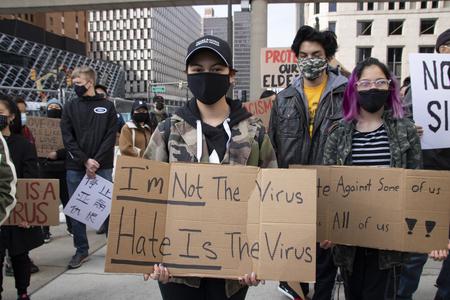
Asian Americans of all ages from Southeast Michigan expressed fear and dismay at the rally, but also the strength to fight back.
Gabriela Abrahamson from Clawson, whose mother is Vietnamese, says it’s time to stand up for family and friends who have been targeted by racism.
“I feel like, especially with the younger generation we can do a lot to change what’s happening in the U.S., and a lot what’s happening around the world and especially in the time of quarantine and of COVID this is the time where we have to take a stand and do something about it,” says Abrahamson.
Misrepresented and forgotten
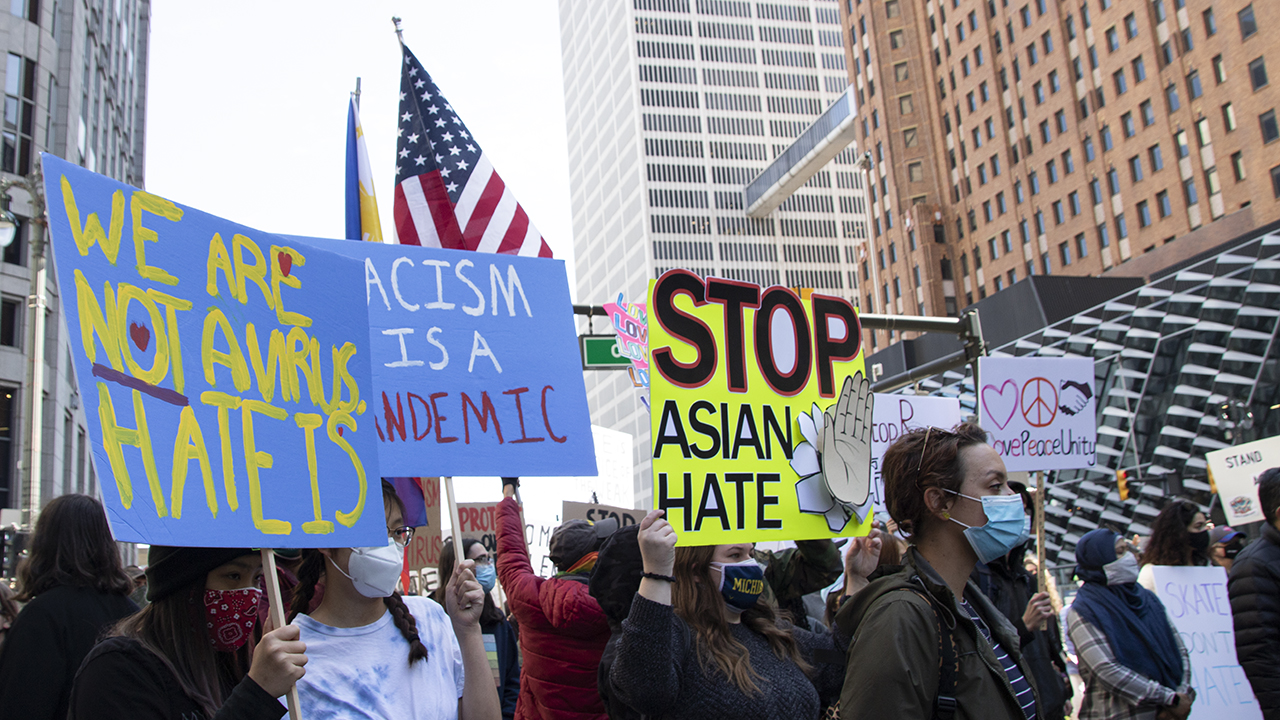
Anti-Asian racism is not new, but it has been not as visible due to a history of exclusion, assimilation, the model minority myth that pits Asians against other communities of color, and lack of teaching Asian American history in schools.
From the Page Act of 1875, which prevented Chinese women from immigrating to the U.S. to the internment of Japanese Americans during World War II, there is a long history of discrimination in the U.S. In Michigan, events like the 1982 beating death of Vincent Chin galvanized the Asian American community to fight for civil rights and visibility.
Annie Hamaty is a sophomore at MSU. She grew up as a Vietnamese adoptee in Hillsdale, Michigan, a predominately white small town. She now lives in East Lansing. Hamaty says Asian Americans have been misrepresented historically and forgotten as a minority because people don’t learn about the community’s history.
“I think a lot of people that are outside of the community aren’t extremely educated about the topic [and] think that this is something that just happened. And in my opinion, I don’t think it’s something just happened. I think that in the past year, it’s a combination … of everything that’s been happening, the violence throughout the pandemic and then also this historical kind of context of it too, how it all led up [to this moment] and now at least it’s been recognized.”
Hate crimes increased during the pandemic
Nearly 3,800 incidents of anti-Asian discrimination were reported in the United States since last March, including 24 cases in Michigan. Some of the people who reported the incidents recounted episodes of verbal harassment and workplace discrimination. Others talked about being told to “go back where they came from” or getting coughed on and spit on.
Rising Voices, a nonprofit that aims to increase civic engagement among Asian Americans, conducted a survey after the presidential election. The survey found that COVID-19 and anti-Asian racism were among top concerns among Asian Americans. Since the Atlanta shootings, Rising Voices has been conducting outreach such as wellness calls and virtual events like healing circles to provide space for people to process and grieve.
“We have to be centering the most impacted and make sure that we’re going beyond just ‘I’m Asian and so I felt a kind of way about this and I’m anxious,’ it’s about what’s next.'” — Laura Misumi, Rising Voices
Hamaty was a part of a healing circle.
“I wasn’t feeling the emotion until that Friday night and then I just broke down, like I couldn’t take it anymore. I kind of got tired of being strong I think or talking about it,” Hamaty says.
There’s more work to do
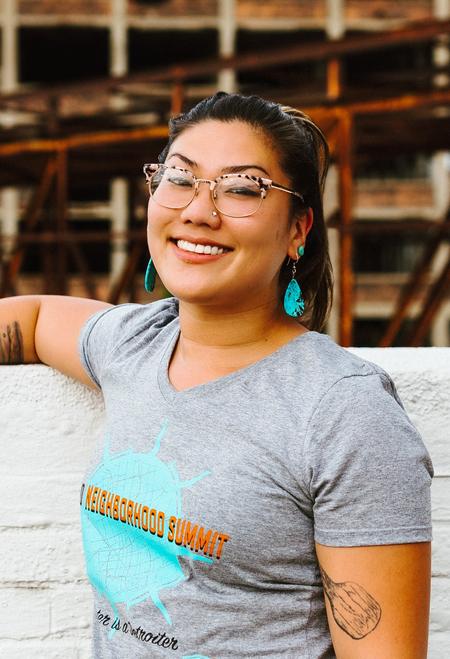
Laura Misumi, Executive Director for Rising Voices, says there is more work to do beyond rallies and protests.
“We have to be centering the most impacted and make sure that we’re going beyond just ‘I’m Asian and so I felt a kind of way about this and I’m anxious,’ it’s about what’s next, like how do we deepen that political analysis, how do we create more relationships with other folks that are going through it,” Misumi says.
Misumi is also the managing director at Detroit Action. She says the rise of xenophobic language doesn’t happen in a vacuum. It’s part of a bigger system that oppresses communities of color.
“Part of the erasure also erases the long history and legacy of multiracial, Asian, Black, Brown organizing that has come before this moment and that we’ve, we want to carry that as, as the legacy that we’re building on not just organizing alone, our community and our diaspora together,” Misumi says.
It’s been nearly two months since the Atlanta shootings and the Stop Asian Hate rallies started. For Misumi, it’s been heartening to see the support after the shootings, but she hopes there’s commitment to what comes next after the spotlight shifts. She says it’s time for Asian Americans to rise up with others and use this moment to help the most impacted, but others need to join in to do the work as well.
Listen: Local Asian Americans are feeling anger, grief — but also the strength to fight back.
Trusted, accurate, up-to-date
WDET is here to keep you informed on essential information, news and resources related to COVID-19.
This is a stressful, insecure time for many. So it’s more important than ever for you, our listeners and readers, who are able to donate to keep supporting WDET’s mission. Please make a gift today.
